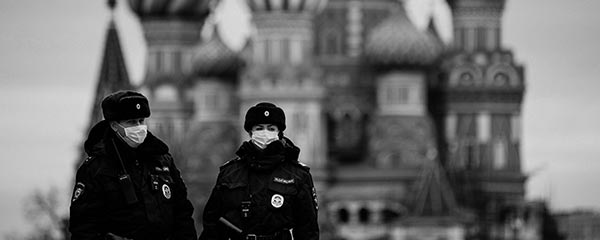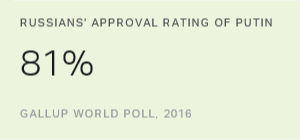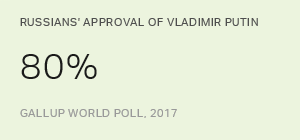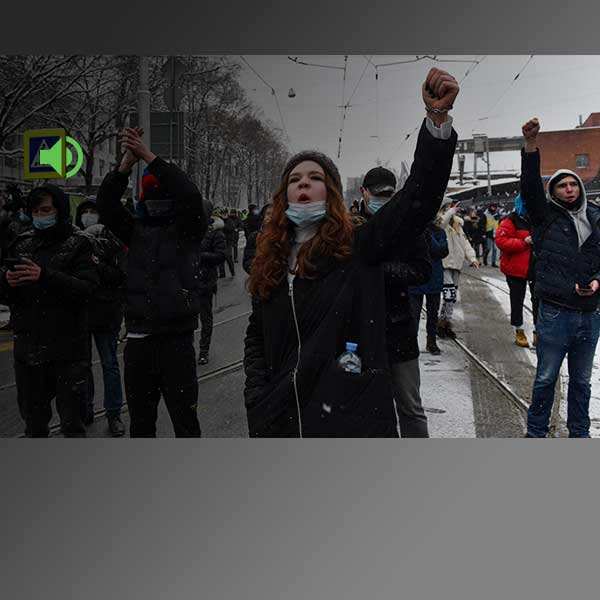Story Highlights
- Record-high 57% of Russians believe their local economy is getting worse
- 69% of Russians lack confidence in the judicial system or courts
- 79% see corruption in government as widespread
WASHINGTON, D.C. -- While Kremlin critic Alexei Navalny's detention in late January sparked some of the largest protests across Russia in years, Gallup surveys in 2020 suggest the roots of Russians' discontent may run deeper than their concern about one man.
Economic Pain Intensified in 2020
During the pandemic, which most Russians (78%) say has had at least some effect on their lives, Russians have grown increasingly pessimistic about the direction of their economy and the jobs situation.
As Russia's pandemic-battered economy suffered its strongest contraction in more than a decade in 2020, a record-high 57% of Russians interviewed in the fourth quarter said their local economic situations were getting worse. This figure was up from 45% in the previous quarter and from 33% the previous year.

Line graph. Russians in 2020 were the most pessimistic they have been in years about their local economic conditions. The majority said conditions where they live are getting worse.
Russians' pessimism extends to their views of the job market. More than three-quarters (77%) of Russian adults say it is a bad time to find a job, which is the worst outlook since the aftermath of the global financial crisis in 2009.
Some of this gloomy outlook likely stems from what Russians have experienced at their own jobs. As Russia shed jobs amid the COVID-19 outbreak, 33% of Russians say they have worked fewer hours because of the pandemic, 32% say they have temporarily stopped working at a job or business, and another 13% say they have lost a job or business for the same reason.
| Yes | No | ||||||||||||||||||||||||||||||||||||||||||||||||||||||||||||||||||||||||||||||||||||||||||||||||||
|---|---|---|---|---|---|---|---|---|---|---|---|---|---|---|---|---|---|---|---|---|---|---|---|---|---|---|---|---|---|---|---|---|---|---|---|---|---|---|---|---|---|---|---|---|---|---|---|---|---|---|---|---|---|---|---|---|---|---|---|---|---|---|---|---|---|---|---|---|---|---|---|---|---|---|---|---|---|---|---|---|---|---|---|---|---|---|---|---|---|---|---|---|---|---|---|---|---|---|---|
| % | % | ||||||||||||||||||||||||||||||||||||||||||||||||||||||||||||||||||||||||||||||||||||||||||||||||||
| Temporarily stopped working at your job or business | 32 | 60 | |||||||||||||||||||||||||||||||||||||||||||||||||||||||||||||||||||||||||||||||||||||||||||||||||
| Lost your job or business | 13 | 81 | |||||||||||||||||||||||||||||||||||||||||||||||||||||||||||||||||||||||||||||||||||||||||||||||||
| Worked less hours at your job or business | 33 | 59 | |||||||||||||||||||||||||||||||||||||||||||||||||||||||||||||||||||||||||||||||||||||||||||||||||
| Received less money than usual from your employer or business | 35 | 57 | |||||||||||||||||||||||||||||||||||||||||||||||||||||||||||||||||||||||||||||||||||||||||||||||||
| Gallup World Poll, Dec. 2-28, 2020 | |||||||||||||||||||||||||||||||||||||||||||||||||||||||||||||||||||||||||||||||||||||||||||||||||||
The pandemic has also taxed many Russians' living standards, which were already facing headwinds over the past decade. In 2020, four in 10 Russians report feeling satisfied with their current standard of living, down from 51% the year before. This negative trend appears to be accelerating, as more than half (51%) of residents say their standard of living is getting worse, compared with 32% who see it getting better.
This may be partly related to the effect that COVID-19 is having on take-home pay, with 35% of adults in the country claiming that they have received less money than usual from their employer as a result of the coronavirus situation.
Russians See Corruption in Both Public and Private Sector
Two days after Navalny's arrest, his anti-corruption foundation released a video alleging that a "palace" in southern Russia had been built for Russian President Vladimir Putin with illicit funds. With living standards getting worse for so many Russians, the news may not have sat well with some of the public, even though corruption in government and business is something of a given in the country.
Most Russians -- no less than 70% for more than a decade -- have perceived corruption as widespread throughout their government and businesses. In 2020, 82% of Russian adults said corruption was widespread in business, and 79% said the same about their government.

Line graph. Strong majorities of Russians perceive corruption as widespread in both the government and businesses in their country. Percentages have not dipped below 70% at any time in the past decade.
Few Confident in the Judicial System
Navalny's arrest and subsequent sentencing to a prison camp have been widely condemned by global leaders, who have raised questions about the independence of the Russian judiciary. Similar sentiments are being echoed in many Russians' views of the justice system in the country. In the month before Navalny's arrest, 69% of Russians reported that they did not have confidence in the judicial system and courts in the country, the highest number since Gallup started asking the question more than a decade ago.
Despite this, Putin still commands a strong overall approval rating of 61%. However, this is down from his peak of 85% in 2015 following the 2014 Sochi Olympic games and after Crimea became part of Russia.
While Putin continues to garner support among Russians, recent years have seen a decline in his job approval among the youth. Nearly six in 10 (59%) of those aged 15 to 29 approved of Putin in 2020, compared with 76% among those aged 50 and older.

Line graph. President Vladimir Putin remains popular among most Russians, but particularly those aged 50 and older. His approval ratings have dipped most among Russians younger than 50 since 2017.
Implications
While many Russians have pinned their hopes to a potential ebbing of the pandemic later in 2021, fundamental problems will remain a concern for the foreseeable future. Renewed calls for climate action, including those from the new Biden administration in the U.S., will see more pressure grow against fossil fuels including oil, a key Russian export.
Moreover, discussions about new sanctions against individuals and institutions in Russia over Navalny's detention -- and the clampdown on protests -- are taking place in the European Union and the U.S. Russian leaders will need to carefully balance efforts to control the pandemic and shore up domestic institutions, while continuing to rebuild the economy.
For complete methodology and specific survey dates, please review Gallup's Country Data Set details.
Learn more about how the Gallup World Poll works.




